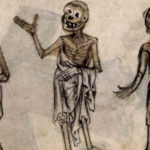We run our website the way we wished the whole internet worked: we provide high quality original content with no ads. We are funded solely by your direct support. Please consider supporting this project.

Did Yahweh Crush His Son?
Though Isaiah was probably referring to the nation of Israel as Yahweh’s “suffering servant” when these words were penned, the NT authors as well as other early church fathers interpreted this servant to be a prophetic reference to Christ. Speaking proleptically, Isaiah declares that this suffering servant was “punished” and “stricken by God” (Isa 53:4, cf., v. 8) and states that “it was the LORD’s will to crush him and cause him to suffer” (vs. 10). The passage thus seems to depict Yahweh as the one who “pierced” his servant “for our transgressions” and who “crushed” his servant “for our iniquities” (vs. 5).
At the same time, while Isaiah ascribes violent verbs to God, he also describes the suffering this servant underwent as the result of humans afflicting him. It was humans who “despised and rejected” this servant as they “hid their faces” from him (v. 3). It was before accusing humans that this servant “did not open his mouth” (v. 7), and it was violent humans who “oppressed and afflicted” this man (v. 7). So too, it was by human “oppression and judgment” that this man “was taken away … cut off from the land of the living” and “was assigned a grave with the wicked” (vv. 8-9). And it was humans from among “his generation” who failed to protest this man’s unjust treatment at the hands of other humans (v. 8). It is thus clear that for Isaiah, as much as for NT authors, Christ was “afflicted” by God only in the sense that it was God who delivered him over to violent humans to experience the death-consequences of our transgressions.
Why then does Isaiah say that the suffering servant was “punished” and “stricken by God” and that “it was the LORD’s will to crush him and cause him to suffer”? I would like to propose that the Father allowed himself to be portrayed as doing something he merely permitted for the same reason the Son takes on an appearance that makes him look guilty of crimes he merely allowed. In this case, the Father’s willingness to take on the semblance of the one who afflicted his Son is simply the flip side of the Son’s willingness to take on the semblance of one who deserved to be afflicted.
This is not to suggest that Isaiah or his original intended audience understood the matter this way. There are plenty of other passages in Isaiah that clearly reflect a pen-ultimate, sub-Christlike understand of Yahweh’s character. Isaiah clearly did not think Yahweh was above engaging in horrific violence. We can discern the humble, stooping cruciform God in the depth of these violent portraits. Here, we can also discern how God the Father was stooping to wear the mask of someone who is responsible for wrongdoings that he merely allowed, just as he does on the cross. The Creator, in other words, is taking responsibility for all that comes to pass in his creation, including the unjust suffering of his beloved servant.
Photo credit: KayVee.INC via Visual Hunt / CC BY-NC-SA
Category: General
Tags: Cruciform Theology, Jesus, Violence
Topics: Attributes and Character
Related Reading

Can You Believe It?
The origin of human sin and the world’s oppression goes back to a deceptive, untruthful picture of God given to Eve by Satan. Jesus came, in part, to finally reveal the absolute truth about God. He is the way and the truth (alethia) and the life (Jn 14:6). The word “truth,” literally means “uncovered.” And…

A Coming Storm
There is a storm beginning to brew on the horizon. It is a debate among Evangelicals about the violent depictions of God, stirred up largely by Eric Seibert’s Disturbing Divine Behavior. Here is a post that sounds “the clarion call.” The debate is presently around two options. Option #1: Traditionalists argue we must simply embrace…

Podcast: If the Cross is the FULL Revelation of God, Why Do We Even Need All the Rest?
Greg discusses the summation of the Bible in the crucifixion. http://traffic.libsyn.com/askgregboyd/Episode_0285.mp3

Podcast: Is There a Moral Difference Between Killing and Murder?
Greg argues against C.S. Lewis’ claim that not all killing is murder. http://traffic.libsyn.com/askgregboyd/Episode_0223.mp3

Podcast: How Do We Respond to Sexual Violence?
Greg discusses a Christ-like response to sexual abuse. Do we “turn the other cheek” in the face of sexual abuse? http://traffic.libsyn.com/askgregboyd/Episode_0077.mp3

The Danger of the Penal Substitution View of Atonement
About 25 years ago I was traveling on the freeway to somewhere or other and I stopped at a truck stop to get a bite to eat. I sat down at the counter next to this scruffy truck driver who had just started his lunch, and we started up a friendly conversation. Within about fifteen…
